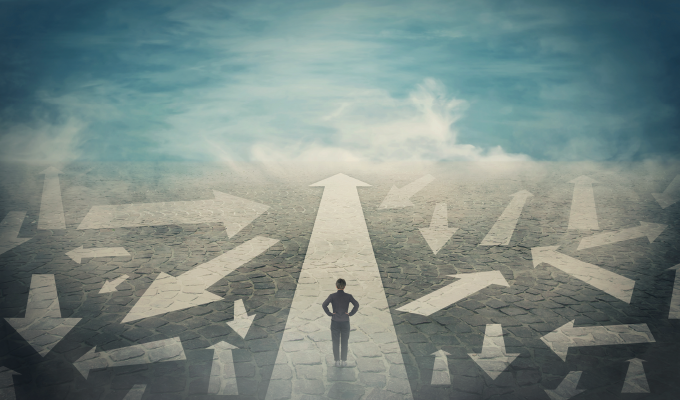I truly believe our lives are the result of our decision making. We are either recipients of good outcomes for proper decisions or victims of bad decisions. The product of our lives has less to do with luck, chance, serendipity, destiny, Acts of God, and more to do with our choices.
Why are some folks not as good at decision-making than others? Let’s face it—some people are better at making decisions than others. But why?
DECISION FATIGUE
Apprehension, stress, and dread can dramatically alter our choices. Stress makes us susceptible to tunnel vision or looking at choices myopically, causing us to be less able to take in the information we need for good decision making. Apprehension and fear make us more risk-averse than we would be normally and can influence us to take the path of least resistance, even though that choice may be the least beneficial.
Also, timing can alter the effectiveness of decision making. In a research paper published by the National Academy of Sciences, psychologists examined the factors that affect whether a judge approves a criminal for parole. The researchers examined 1,112 judicial rulings over a 10-month period. All of the rulings were made by a parole board judge, who was determining whether to allow the criminal to be released from prison on parole. One would think many factors (such as the type of crime, the reputation of the parole candidate, etc.) would influence the choice to parole or not parole. However, the study found the single biggest influence on their decisions was the time of day.
What the researchers found was that at the beginning of the day, a judge was likely to give a favorable ruling about two thirds of the time. However, as the morning wore on and the judge became exhausted from making multiple decisions, the likelihood of a parole candidate getting a favorable ruling steadily dropped to zero. After a lunch break, however, the judge would return to the courtroom restored and relaxed, and the likelihood of a favorable ruling would immediately jump back up to two thirds. As the day passed, the percentage of favorable rulings would drop back to zero by the end of the day.
This trend held true for more than 1,100 cases. It didn’t matter what the crime was—murder, rape, theft, embezzlement—a parole candidate was much more likely to get a favorable response if their parole hearing was scheduled in the morning (or immediately after lunch) than if it was scheduled near the end of a long session. Researchers often refer to this phenomenon as “decision fatigue.” When the judge on a parole board experiences decision fatigue, they deny more parole requests. If you take a moment and think about it, it makes sense. When we are tired and stressed, we are less likely to make well-informed decisions.
NATURAL-BORN OPTIMISM
We also need to be aware of our natural-born optimism, for that can harmfully influence decision making, too. Decision making is selecting a choice of actions based on risks versus rewards. Ideally, we want to pick the choice that offers the most gains with the least risks. However, sometimes we may discount the risks with self-messages like, “I know there are some real risks with this, but I am confident I can work it out” or, “I realize this may not be perfect but I am sure our people will overcome these obstacles to make this possible.” That over-confidence can springboard a choice that really is unfounded.
A VICIOUS CYCLE
Michael S. Vaughan, managing director and CEO of The Regis Co., states, “Poor decision making creates a vicious cycle that reinforces an already present anxiety about decision making.” In other words, if a person has made many poor choices before, a “self-fulfilling prophecy” of poor choices causes them to continue in that vein, as they expect to continue the pattern. Vaughan’s theory is that an enormous amount of time is wasted on undoing or justifying poor decisions, which again creates more apprehension about decision making. He says, “This cycle continues and further reinforces an individual’s fear of making important decisions.” And that means employees become less likely to step up, share innovative ideas, or solve problems.
Another reason we make bad decisions is our beliefs and paradigms. Paradigms are defined as a typical example or pattern of something; a pattern or model. It is molded by our experiences and values. Paradigms that are in-synch with those beliefs and values are easily embraced. Those that are at odds with or in contrast to our beliefs and values are often rejected. Therefore, we may resist leaning toward certain decisions that are out of synch with those things we believe in and value. Listen to a discussion on politics or religion by people whose paradigms are different.
An additional barrier to good decision making is irrational fear. An example would be the common fear of flying that many people have despite the fact that it is far safer than driving an automobile. This “upsizing” of the risk factor can cause people to make the wrong choices based on irrational fear.
CLOSING THOUGHT
Yet another fallacy to decision making is the pressure to make a quick decision. Short-term pressures can negatively affect long-term choices by causing us to react without doing our due diligence or homework. Another time related issue is people often have a weakness for the immediate gratification from an enjoyable experience, even if it produces a substandard decision. Gratification over the long-term simply doesn’t produce the same instant, feel-good endorphin fix.
For more information:
Preston Ingalls is president and CEO of TBR Strategies, LLC, a Raleigh, North Carolina-based maintenance and reliability firm specializing in the construction and oil and gas industries. Preston can be reached at pingalls@tbr-strategies.com.
Modern Contractor Solutions, December 2020
Did you enjoy this article?
Subscribe to the FREE Digital Edition of Modern Contractor Solutions magazine.



